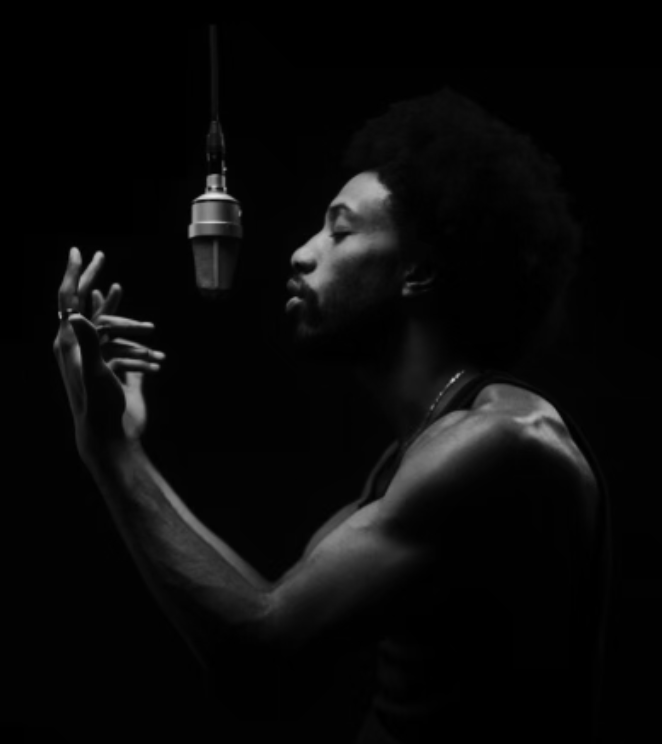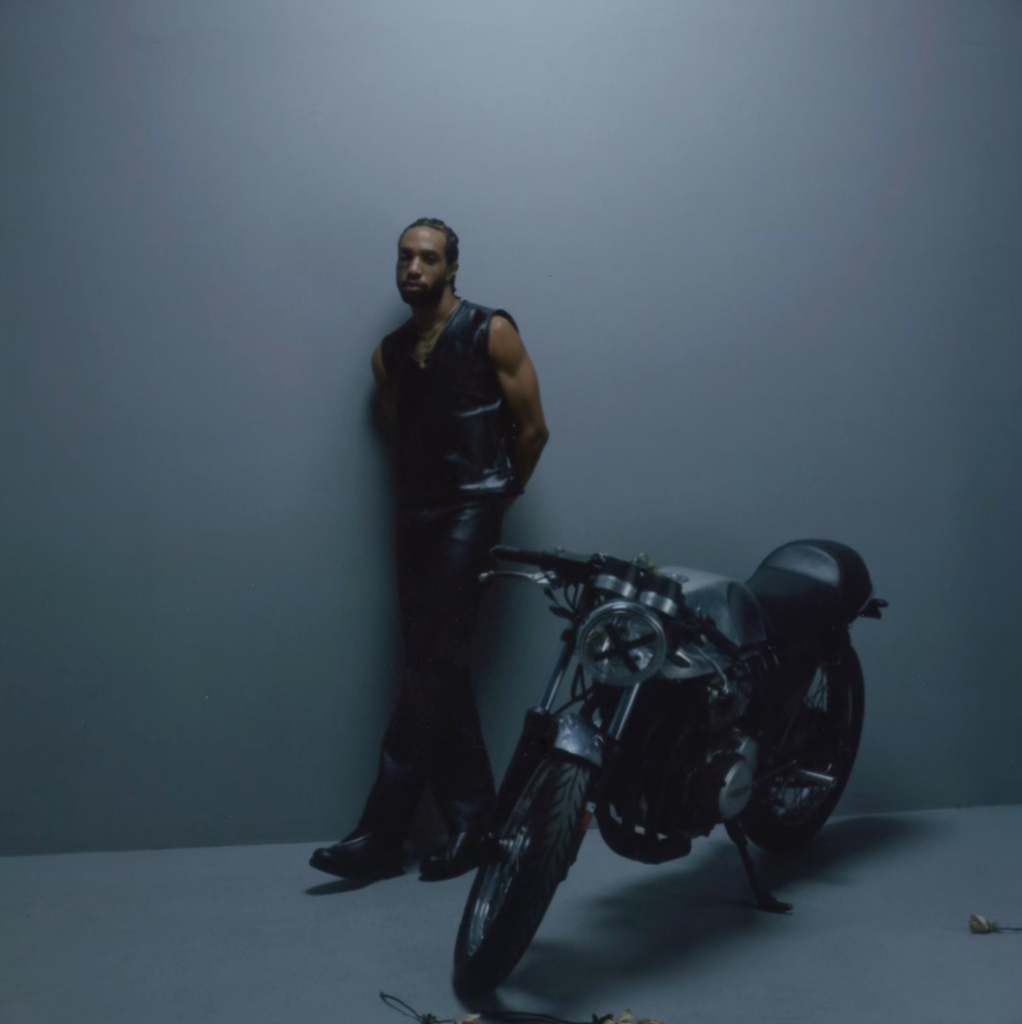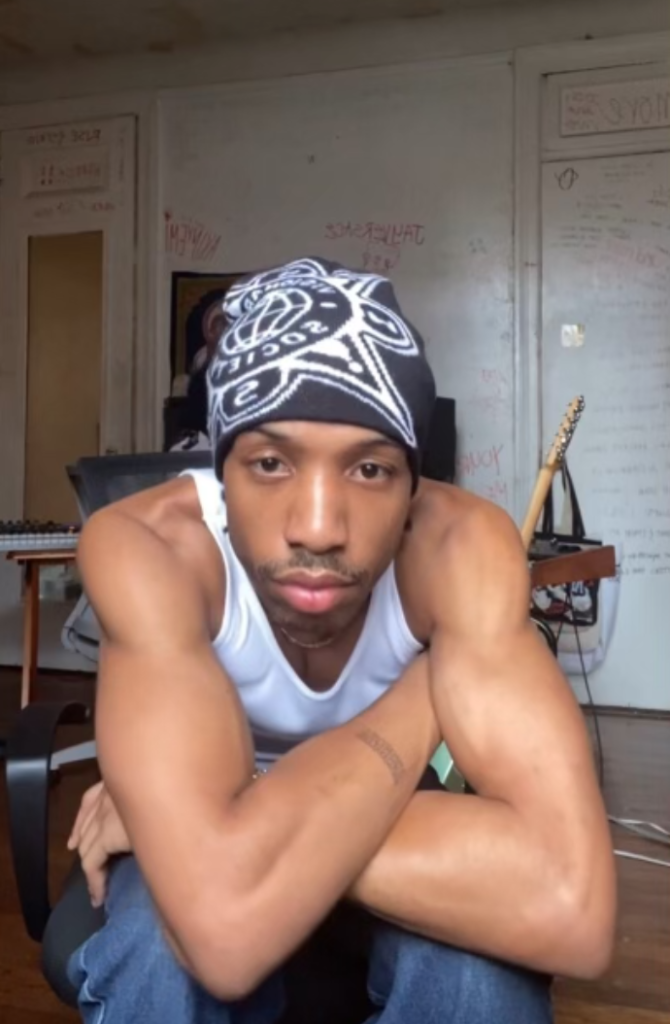HUSH FORTE: On Embracing the Chaos

With origins in classical piano, Hush Forte has lent his refined, lush production—with roots in R&B and alternative music—to an impressive portfolio of instrumental work, from his 2019 full length album, Ardor, to collaborations with Q and Nana. But pandemic-imposed solitude encouraged Hush to venture into his own voice, one he displays with integrity on his 2021 album, Look Closely, and more recently on his newest single, “Call the Bluff,” released in December 2022. In our conversation, Hush makes it clear that his music is a vehicle for navigating and processing his own life—and he encourages the world to come along for the ride.
Who is Hush Forte?
I’m originally from South Florida, currently based in New York. I started engaging in music as soon as I had my earliest memory. I remember I had this one little drum and was always beating on it, and then I started taking piano lessons when I was five. When I was 12 or 13, I picked up guitar for the first time as an elective in school because I was like, “Why not?” But it ended up growing on me a lot and I took all of that and started trying to apply it to my taste in music, because a lot of what I was learning was classical or just in genres that I had no spiritual connection to.
I have a brother that is 10 years older than me. For a lot of my youth, he was already out the crib—in college or living on his own. Anytime he’d come visit, he’d always come with a bunch of mixtapes and downloaded songs that my friends and I didn’t even know about yet because he was just so in tune. So I sort of became that guy that was ahead of a lot of music. By the time I was 14, music was kind of just my escape from everything.
My real name is Corey, and most people knew me as a hooper up until my second year in college. Music was always something that I honestly thought was nerdy and lame, so I never really spoke to anyone about it or let them into that world. Even though my parents obviously knew I was playing the piano, when I actually started messing around and making beats and uploading them on Soundcloud and Youtube—you know my parents are Caribbean, they didn’t see music as a career, but rather a hobby. So, I didn’t want to let them into my world, and I didn’t want to let my friends in either because it would have shifted my identity, since I wasn’t an outwardly artsy person. There was always a duality to what I was showing to the world and what I escaped to—Hush Forte was a place for me to escape to.
It sounds like you had converging identities growing up as a musician and basketball player. What were you studying in college—did you have a third separate interest?
By the time I was going to college, my identities were really forced to crumble. I think that’s what really birthed me into pursuing music more aggressively. In college, I stopped playing basketball. But I had really high math scores which helped me get into UCF. So, it was like, “Okay, be an engineer.” I went to school to study computer engineering and I didn’t do terribly, but I did two years and was like, “This is not what I’m supposed to be doing, this is not for me.” It was easy for me to make friends in high school because people saw me on the court. I had a group of teammates right away. When I went to college, I had none of that. It forced me to really deal with my isolation. It was my first time really experiencing loneliness, which led me to attach to music a lot.

How has your classical foundation influenced your music and career?
It’s exactly what it’s called: a foundation. It’s a tool. I’m not going to sit here and say that you need it to be a talented musician. I don’t think you need it. Music was just weaved into my thinking so early in life, in ways that I probably can’t even explain how it impacts my music or how I hear a certain chord or melody. It’s just instinct now. I think it helps with my musical instincts.
What influenced your shift from your earlier instrumental tracks to now incorporating your own vocals?
An identity crisis. The simple way to say it: I stopped being scared of my voice. When I say “scared of my voice,” not only how it sounds but also what I have to say. Growing up, I wasn’t in a very expressive household. We didn’t talk about emotions and I didn’t really know how to express myself. I remember one time my piano teacher was like, “Sing while you play.” And I was like, “No, what are you talking about?! I don’t do that.” I never even gave it a shot. I mean maybe I’d freestyle every once in a while with the homies. It was just a transition for me as I became more comfortable with myself. I went from making beats to producing other people into my songs, but then I’d be in the studio with them and say, “Yo, you should try this and do this.” And then I was like, “You should try that!” It really hit me around the pandemic that I was shying away from my own expression. I realized that what made people gravitate towards me in real life was what I have to say, my perspective, my tone of voice. So, why not implement that into the music?
What’s your decision making process like when collaborating with other artists?
It’s never really a decision. Right now I’m in a less collaborative space, but I never wanted it to feel like a decision. If it felt like one, it’s probably not natural. With Q, to be specific, we’re from the same place in Florida and we both felt, when we met each other in 2018, it was like, “Yo, I don’t meet anyone else like us out here.” It was just so refreshing to meet each other, hang out in the car and play each other’s unreleased music we were working on. We’d be in the studio, just chilling and not even making music and talking about life until 5AM and going to the beach in the morning afterwards. It was really just like a bromance. To this day, he’s one of my closest friends. I like to work with people I feel that comfortable with. We’re not in the studio saying, “We’re going to make a hit song.” We’re just in the studio one day, strumming guitar, messing around with sounds and the next thing you know, we’ve got something. On “Run the World” with Nana, it was a similar situation. I was a fan of his first and admired him as a person. Our conversations were real and I feel like that weaves itself into the chemistry of our record. As I’ve gotten deeper, there is obviously more structure to it. But, I’ve never collaborated with someone I wouldn’t feel comfortable hitting up and asking, “What’s good, what’s on your heart?”

Let’s get into this newest track, “Call the Bluff.” What does this release mean to you?
I’m curious, what feelings do you take away from it, before I answer that? And I say that because I like for art to be perceived first before explained.
I appreciate that process. For me, I feel music is very situational. I’ve listened to the track over the past few weeks while traveling. When I listen to a track for the first couple of times, I’m focusing on the beat and atmosphere the most. So overall, I’d say it’s a very grounding song.
I love that. That’s not the first time I’ve heard “grounding” when someone explains my music to me. I feel that the grounding nature of the song is almost to contrast the feelings behind the music. When you meet someone who is very, very, very calm, you wonder, “Hm, why are you so calm? Maybe you had to work really hard to be this calm.” I think “Call the Bluff is kind of like that. In the actual message of the song, I was processing some hurt I was going through—friendship betrayal. There were multiple situations in which people I’d gotten close to and been vulnerable with and allowed to be vulnerable with me ended up backfiring on me. Honesty is a tricky thing because sometimes you can be honest with someone but what you have to say to them is going to be hurtful. You can hit a moment of confrontation and they have the option to go through the pain and work on it together, or just disappear. I had some people disappear and it made me ask myself, “Should I be less honest or detached?” It’s not a great feeling so I felt like I almost had to overcompensate for that by making music that feels so good.
In “Far Away,” off your most recent album, Look Closely, you sing: “A&Rs giving they regards and early praise, been tryna wrap up the album tired of conversations.” Breaking into the industry as an artist sounds exhausting – what has the process been like for you as you interact with industry players like A&Rs?
That line specifically references when I was working on my first project in LA and was a 10 hour time zone difference away from my girlfriend at the time. I was trying to work on music and there were certain A&Rs I was talking to, gassing me up. But I didn’t understand why they were gassing me up yet when the music wasn’t done. That was literally what was in my head. It’s a question of the music industry and how real people are. Are you telling me things to make me like you so I will want to work with you? Or will you keep that same energy if we ended up not working together? And that’s not only specific to music. People are really nice and they love you and you’re their favorite person, but as soon as you decide to go another direction or take the mask off a bit, they start to get a little quiet and disappear. The lifestyle of being an artist alone is ridiculous, it’s almost just like a huge social experiment. Everyday it gets more and more chaotic, and I’m just embracing the chaos of it all.

Where would you like to see yourself one year from now?
In general, I want to expand my reach overseas and learn more. I want to challenge my creative process—I have my way of doing things and I want to add onto that. I want to be in more studios with people that inspire me and take notes from them. I really just want to grow my impact. I want to have more people laugh, cry, fall in love to my music. I want to take more risks sonically and creatively on stage. Show people I do this for myself and that I’m inviting them into a life I’d be living and obsessing over anyways, whether or not I had people watching.
What are you listening to, watching, or reading right now?
Stereolab, Dean Blunt, Nick Hakim, Blood Orange, Yves Tumor. I’m always mixing in some Outkast and old Pharrell, The Neptunes. Every once in a while, I have to run through all of Frank and Kendrick’s discographies. Been going back to a lot of Tyler because there are certain sonic things he’s accomplished that I’m like, “Damn, he’s so good.” I’ll go on Youtube and watch random scenes that are interesting to me, just to exercise my screenplay/director brain. Visuals and film are things I’m a nerd about. I’ll also just be on Pinterest scrolling, it’s like my little safe haven.
Follow Hush Forte: Instagram & Twitter (@HUSHFORTE)




